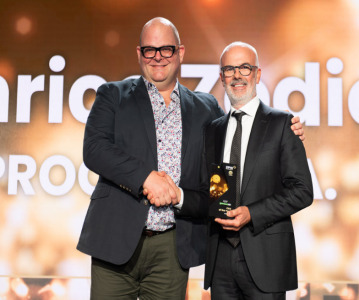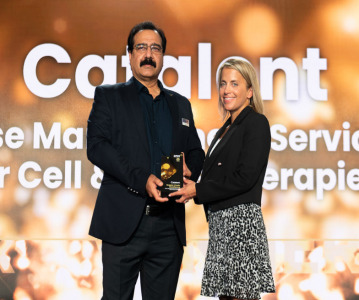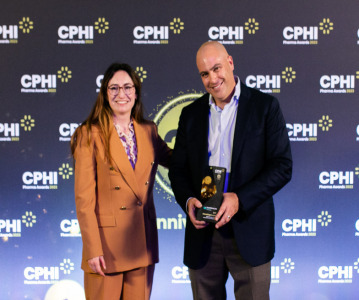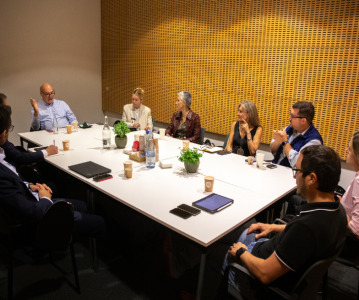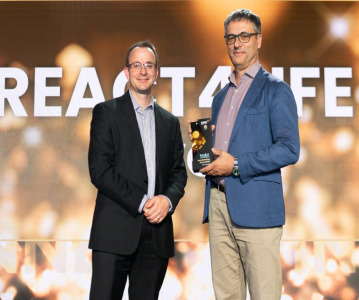CPHI Pharma Awards 2023 – At the Heart of Pharma winners: Merck KGaA
.png)
After another year of impressive nominations for the CPHI Pharma Awards our winners were announced at CPHI Barcelona in October 2023. In this series of interviews, we speak to the people and teams behind the award-winning projects, concepts, and technologies.
In the following interview, Mihaela Militaru, Senior Director of Patient Insights and Advocacy at Merck KGaA, Darmstadt, Germany, describes the Embracing Carers® initiative, which aims to raise awareness of caregiver needs, and improve the quality of life of carers.
Please can you give some background to Merck KGaA and the aims and goals of the company?
Headquartered in Darmstadt (Germany), Merck KGaA is the world’s oldest pharmaceutical company, that has been driven in its 356-year history by the same aspiration: advancing human progress. The company employs more than 64,000 people across 66 countries and operates in three sectors: Healthcare, Life Science, and Electronics.
You won the ‘At the Heart of Pharma’ prize for your Embracing Carers® initiative – please can you tell us a little more about this project?
Embracing Carers® is a project launched in 2017 with the objective of building awareness of the role and challenges faced by informal carers, both inside and outside of the company. We learnt something very important over the years: the people most suited to address and deal with the everyday needs of carers are carers themselves, who experience this reality daily. As such, Merck KGaA worked extensively with organisations like Eurocarers, Carers Worldwide, the International Alliance of Carer Organisations, the Swallows, Fight Bladder Cancer UK, and Digestive Cancers Europe, to name just a few, to support the creation of dedicated carer support tools.
Looking at concrete examples of impactful collaborations that were fostered last year, we for example worked with the Global Initiative on Ageing (GIA), a foundation under the auspices of the UN, to translate a curated selection of GIA’s modules into English for Embracing Carers®. The modules provide professional instruction on caretaking including topics such as nutrition, administration of medicines, communication, and motivation.
I would really need more pages to outline the numerous initiatives that we developed, implemented or supported through this wonderful project. I can only but encourage those who wish to learn more to have a look at this dedicated website.
What challenges have you encountered in setting up Embracing Carers®, and how did you overcome these?
Besides the community projects I mentioned above, supporting our employees who are carers is essential to our company. Over the last couple of years, we have introduced flexible working practises, to ensure that carers are supported and valued throughout the organisation. Equally important, in 2022, our carer employees co-created an internal training to help management and peers understand how to better support and celebrate the unique strengths that caregiving employees bring into the workplace.
All these internal changes were not easy to implement. As a global company, we had to navigate many local policies (both internally and externally), as well as a huge variety of different cultural attitudes. It is very difficult to provide trainings or benefits that are equally helpful to all employees, across all countries, and in all three sectors of our business.
We managed to overcome all such challenges through a close collaboration with our HR department and the strong commitment and support from our CEO.
Embracing Carers® represents an overlooked community, do you think this initiative will help to inspire support for other overlooked communities?
Absolutely! In parallel to Embracing Carers®, Merck passionately runs another initiative named “Healthy Women, Healthy Economies” that aims to break down the barriers relating to health and workplace integration, as there are still countries with significant inequality. The initiative, which began in partnership with the Asia Pacific Economic Cooperation Forum, aims to identify and implement policies that advance women’s health and well-being to support their economic participation. The collaboration between Merck KGaA and the US and Philippines governments was the first to explicitly link the subject of women’s health and well being with economic growth. Running these two initiatives allowed us to realise that the act of caregiving actually disproportionately affects women across the world.
How can this initiative be used to take important conversations to stakeholders and policymakers and what change are you hoping to see?
Since we embarked on this journey 7 years ago, several important policy or legislative changes were introduced and awareness milestones were reached in support of carers. Just looking at Europe, the Work-Life Balance Directive entered into force in 2019, which requests EU Member States to provide a “carers’ leave” of five working days per year for all workers with caring responsibilities. In 2020, Eurocarers launched the first ever European Carers Day to coordinate and foster national efforts to raise awareness of carers’ issues under a pan-European structure. We are a proud supporter of this Day, celebrated every year on the 6th of October.
In 2022, the European Commission presented the European Care Strategy to improve the situation for both care receivers and carers, whether professional or informal. The Strategy was accompanied by two proposals for (non-binding) Council Recommendations, one of which (focusing on ensuring access to affordable high-quality long-term care) recommends that Member States establish “clear procedures” to support informal carers in their caregiving activities, notably by “supporting them in balancing work and care responsibilities”.
We have come a long way, clearly. Notwithstanding these positive developments, informal carers still need support in their caregiving journey, whether related to psychosocial support, or tailored and practical guidance from healthcare professionals. Above all, informal carers need support to ensure their rights are reflected and enshrined in national guidelines and legislations.
With the rise of chronic illnesses and ageing populations, the role of informal carers in securing sustainable and efficient healthcare systems has never been more important. Carers need support, now more than ever. Progress can only be achieved through a collective movement from governments, civil society, and industry – from each and every one of us. I’m proud of being part of a company who is committed to play a leading role on the private sector side. Initiatives like Embracing Carers® have the potential of gathering support around the cause.
What does winning the award mean to you and how will it help you as a company?
Winning this award holds profound significance for our company, igniting a surge of enthusiasm that resonates throughout every facet of our organisation. This recognition not only validates our commitment to the cause of informal carers, but also fortifies our belief in the transformative power of Embracing Carers®.
The award serves as a powerful affirmation, infusing our team with a renewed sense of purpose and determination. It is a testament to the tireless efforts we have dedicated to filling the crucial gap in support and recognition for informal carers. Finally, this acknowledgment underscores the societal value of championing the cause of informal carers and reinforces our commitment to making a lasting impact on the lives of all informal carers.
The role of carers in the healthcare industry is oft overlooked, do you think/hope more initiatives to provide support will be set up in the future? Does Merck KGaA hope to continue to advocate for this?
I certainly do hope so! In the European Union only, an estimated minimum of 52 million working-age individuals are engaged in the provision of regular care for ill family members, outside of professional or formal settings. This percentage varies from 6% to almost 27% across different countries. These numbers speak volumes: if you are not a carer yourself, you certainly know one.
We cannot achieve our goals to protect and support informal carers if we are not ambitious. And we must match that ambition with the consistency needed to fight the long fight. So yes, our company’s commitment to the cause of informal carers remains intact. Just to give you an example, we are currently working on new initiatives that aim to provide solutions to the challenges faced by carers supporting those with cancer, multiple sclerosis and myasthenia gravis.
We know from discussions with carer advocates that this is a high need area and that greater inclusion of informal carers as part of the healthcare team can benefit patients. We will always continue to advocate for greater inclusion of carers from all parts of the healthcare space, whether it be from the public or private sector, and we continue to look for new and innovative ways to partner with groups who can help make lasting change.
More about Mihaela Militaru
Mihaela Militaru serves as Senior Director, Patient Insights and Advocacy at Merck KGaA, Darmstadt, Germany. In this role, Mihaela is responsible for the development and implementation of the company’s EU patient engagement strategy in oncology, embedding the patient voice throughout the continuum of research, development, and commercialisation. Prior to her current role, she was the Director of Europe’s largest cancer patient umbrella organisation – the European Cancer Patient Coalition. Mihaela’s career also includes over 12 years in EU affairs, first as a Liaison Officer of the Romanian Senate to the European Parliament and subsequently as a policy adviser within the European Parliament.
See more about Embracing Carers® by clicking the button below.
Related News
-
News CPHI Pharma Awards 2023 – Packaging & Machinery Winner: Gasporox
After another year of impressive nominations for the CPHI Pharma Awards our winners were announced at CPHI Barcelona in October 2023. In this series of interviews, we speak to the people and teams behind the award-winning projects, concepts, and techno... -
News CPHI Pharma Awards 2023 – CEO of the Year Winner: Enrico Zodio, PROCOS S.P.A.
After another year of impressive nominations for the CPHI Pharma Awards our winners were announced at CPHI Barcelona in October 2023. In this series of interviews, we speak to the people and teams behind the award-winning projects, concepts, technologi... -
News CPHI Pharma Awards 2023 – Supply Chain Excellence Winners: Catalent Case Management Services
After another year of impressive nominations for the CPHI Pharma Awards our winners were announced at CPHI Barcelona in October. In this series of interviews, we speak to the people and teams behind the award-winning projects, concepts, and technologie... -
News CPHI Pharma Awards 2023 – API Development and Innovation Winners: Snapdragon Chemistry, a Cambrex Company
After another year of impressive nominations for the CPHI Pharma Awards our winners were announced at CPHI Barcelona in October. In this series of interviews, we speak to the teams behind the award-winning projects, concepts, and technologies. -
News Navigating the Future: Challenges and Opportunities in Pharma Innovation and Investment – CPHI Barcelona 2023 Roundtable Report
In this comprehensive downloadable report, hear from a range of experts in finance and investment in the pharma industry on what investment trends will be shaping the future of the industry, in Catalonia, and the wider world. -
News CPHI Barcelona 2023: Partnering for Success – Managing Outsourcing Relationships to Optimise Manufacturing Operations
During CPHI Barcelona 2023, insightful content sessions offered attendees the chance to explore trending topics with expert speakers and panellists. Here, we summarise what the pharma industry and supply chain are talking about the most. -
News CPHI Podcast Series: The 2023 Retro – what have we learnt from the past year in pharma?
Welcome to the last episode of 2023! Digital Editor Lucy Chard is joined by her teammates in a special retrospective episode to close out the year. Guests Vivian Xie, Editor for CPHI Online and Tara Dougal, Content Director for Pharma, discuss their hi... -
News CPHI Pharma Awards 2023 – Accelerating Innovation Winners: React4Life
After another year of impressive nominations for the CPHI Pharma Awards our winners were announced at CPHI Barcelona in October. In this series of interviews, we speak to the teams behind the award-winning projects, concepts, and technologies.
Position your company at the heart of the global Pharma industry with a CPHI Online membership
-
Your products and solutions visible to thousands of visitors within the largest Pharma marketplace
-
Generate high-quality, engaged leads for your business, all year round
-
Promote your business as the industry’s thought-leader by hosting your reports, brochures and videos within your profile
-
Your company’s profile boosted at all participating CPHI events
-
An easy-to-use platform with a detailed dashboard showing your leads and performance

.png)
